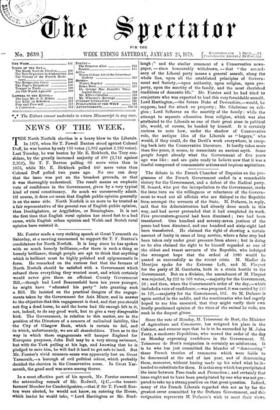in a most effective part of his speech, Mr. Forster
answered the astounding remark of Mr. Rodwell, Q.C.,—the tenant- farmers' Member for Cambridgeshire,—that if Sir T. Fowell Bux- ton were elected, he would not know, on entering the House, which leader he would take, "Lord Hartington or Mr. Brad-
laugh ;" and the similar comment of a Conservative news- paper, — since honourably withdrawn, — that "the ascend- ancy of the Liberal party means a general assault, along the whole line, upon all the established principles of Govern- ment and Society,—upon authority, upon religion, upon pro- perty, upon the sanctity of the family, and the most cherished traditions of domestic life." Mr. Forster said he had tried to conjecture who was expected to lead this very formidable assault. Lord Hartington,—the future Duke of Devonshire,--would, he suppose, lead the attack on property ; Mr. Gladstone on reli- gion; Lord Selborne on the sanctity of the family ; while the attempt to separate education from religion, which was also attributed to the Liberals as one of their great aims in political life, would, of course, be headed by himself. It is certainly curious to note how, under the shadow of Conservative rule, the antique idea of the Liberals as "bogeys," who would, if they could, do the Devil's work everywhere, is creep- ing back into the Conservative literature. It hardly takes more than five years, it seems, to resuscitate an ancient myth. Some people forget already what the Government of five years ago was like ; and are quite ready to believe now that it was a fearful compound of communistic actions and impious aspirations.


































